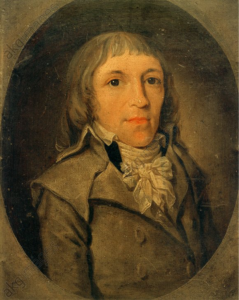To Rosa II
(Poet's title: An Rosa II)
Set by Schubert:
D 316
[October 19, 1815]
Part of Kosegarten (putative cycle)
Rosa, denkst du an mich, innig gedenk ich dein,
Durch den grünlichen Wald schimmert das Abendrot,
Und die Wipfel der Tannen
Regt das Säuseln des Ewigen.
Rosa, wärest du hier, säh ich ins Abendrot
Deine Wangen getaucht, säh ich vom Abendhauch
Deine Locken geringelt –
Edle Seele, mir wäre wohl!
Lieber lehn ich an dir, als an der Einsamkeit
Trautem Busen. Mir klingt süßer der Flötenton
Deiner klagenden Stimme
Als das Säuseln im Tannenhain.
Oft umfingest du mich, meine Holdselige,
Mit vertraulichem Arm, wenn ich an deiner Brust
Melancholischem Frieden,
Schwärmens müde, mich rettete.
Jedes leisere Weh, jedes verschiegne Ach,
Das den Busen mir presst, haucht´ ich dir öfter aus,
Schöpfte freieren Odem,
Klomm heroischer felsenan.
Nie soll darum ein Freund meiner holdseligen
Rosa mangeln, und nie Milderung ihrem Gram!
Nie sei trostlos ihr Leiden,
Ihre Urne nie blumenleer!
Rosa, do you think about me? I think deeply about you.
The sunset shimmers through the greenish forest
And the tops of the fir trees
Are moved by the rustling of eternity.
Rosa, if you were here, in the sunset I would watch
Your cheeks being bathed, because of the evening breeze I would watch
Your locks being curled.
Noble soul, that would be good for me!
I would rather lean on you than on a breast devoted to loneliness.
It sounds sweeter to me – the warbling tone
Of your lamenting voice –
Than the rustling in the grove of fir trees.
My blessed one, you have often caught me up
In your devoted arms, when I was at your breast,
With melancholy peace,
When I was exhausted with frenzy, you saved me.
Each soft sigh, each suppressed groan
That pressed on my breast, I exhaled it more often for you;
I managed to summon up freer breath
To scramble more heroically towards the cliffs.
Therefore my blessed Rosa is never going to be without a friend,
And her grief is never going to be without alleviation!
Let her sufferings never be without consolation,
Let her urn never be empty and without flowers
All translations into English that appear on this website, unless otherwise stated, are by Malcolm Wren. You are free to use them on condition that you acknowledge Malcolm Wren as the translator and schubertsong.uk as the source. Unless otherwise stated, the comments and essays that appear after the texts and translations are by Malcolm Wren and are © Copyright.
☙
Themes and images in this text:
Arms and embracing Being solitary, alone and lonely Cheeks Chest / breast Emptiness and fullness Eternity Evening and the setting sun Flowers Frenzy and lack of control Green Hair Pain Pine trees Roses and pink Sighs and sighing Soothing and healing Sweetness Urns Wind Woods – groves and clumps of trees (Hain) Woods – large woods and forests (Wald)
We begin in the woods at sunset, where the shimmering and the rustling remind the poet of Rosa. She is not here, as previously she was, with her cheeks being dipped in the red glow of the sunset (Abendrot, lit. evening red), or with her long hair being twisted by the light winds of evening. These are the breezes that cause rustling in the treetops but also shimmering in the light. Nothing is fixed or still.
Unlike her constancy. He longs to lean on her for stability. He would rather hear her sad voice than the empty rustling in the trees now, and all of the uncertainty and unreliability that this evokes. He recalls the times when she was a fixed presence for him, occasions when she saved him from excess. He used to exhaust himself through enthusiasm or frenzy (Schwärmens müde), but in her arms he found peace, albeit a ‘melancholy’ peace. He is clearly not the sort of person who could ever have rested totally or found fullfilment in utter stillness.
The idea of breezes (introduced with the rustling in the woods in stanzas 1 and 2) is then developed. It is not the outer wind that matters, but his own breathing. His sighs and exhalations are the breezes that move her. When he took deeper breaths (presumably in one of his manic, frenzied episodes) they too were inspired by her and intended for her.
Only then, in the final staza, do we realise that Rosa can be no more than a memory. All that is left to represent her is an urn, a funerary monument.
☙
Original Spelling An Rosa II Rosa, denkst du an mich? Innig gedenk' ich dein. Durch den grünlichen Wald schimmert das Abendroth, Und die Wipfel der Tannen Regt das Säuseln des Ewigen. Rosa, wärest du hier, säh' ich ins Abendroth Deine Wangen getaucht, säh' ich vom Abendhauch Deine Locken geringelt - Edle Seele, mir wäre wohl! Lieber lehn´ ich an dir, als an der Einsamkeit Trautem Busen. Mir klingt süßer der Flötenton Deiner klagenden Stimme, Als das Säuseln im Tannenhayn. Oft umfingest du mich, meine Holdselige, Mit vertraulichem Arm, wenn ich an deiner Brust Melancholischen Frieden, Schwärmens müde, mich rettete. Jedes leisere Weh, jedes verschiegne Ach, Das den Busen mir preßt, haucht´ ich dir öfter aus, Schöpfte freyeren Odem, Klomm´ heroischer felsenan. Nie soll darum ein Freund meiner holdseligen Rosa mangeln, und nie Milderung ihrem Gram! Nie sey trostlos ihr Leiden, Ihre Urne nie blumenleer!
Confirmed by Peter Rastl with Schubert’s source, L.T.Kosegarten’s Poesieen, Neueste Auflage, Zweyter Band, Berlin 1803, pages 86-87; and with Gedichte von Ludwig Theobul Kosegarten. Zweiter Band. Leipzig, bei Ernst Martin Gräff. 1788, pages 238-239.
Note: In his early editions Kosegarten included only two (independent) poems titled An Rosa, without a subtitle, and they did not yet constitute a part of his later cycle of the four poems An Rosa.
To see an early edition of the text, go to page 86 [90 von 298] here: http://digital.onb.ac.at/OnbViewer/viewer.faces?doc=ABO_%2BZ184217005


